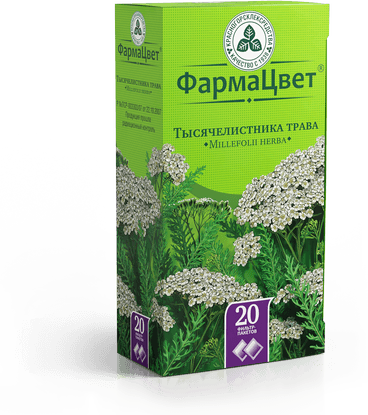Yarrow (Millefolii herba)
$5.00 inc. VAT
Yarrow (Achillea millefolia), also known as Soldier’s Woundwort or Thousand-Leaf, belongs to the Asteraceae family and is a relative to Chamomile. It can be found everywhere in Russia and Eurasia.
Throughout history Yarrow was the herb for the battlefield, hence its nickname “Soldier’s Woundwort”.
Even Yarrow’s generic name, Achillea millefolia, is associated with battle and the name of the Greek hero Achilles, who healed the wounds of his companions with this herb.
In Russia, Yarrow has been known for a long time as a hemostatic agent as well.
Whilst its ability to staunch blood flow is second to none, Yarrow was also used to relieve pain, inflammation, fight infection and soothe spasms.
Therapeutic Properties of Yarrow
Yarrow’s healing properties are due to a huge number of active biological components contained in it.
These are flavonoids, essential oils, vitamin K and C, tannins, coumarins, alkaloid achilleins, organic acids, macro- and microelements, and other biologically active substances.
Due to the vitamin K, the main effect of this herb is the hemostatic one, as it improves blood clotting, therefore giving Yarrow the ability to stop heavy bleeding.
Tannins are responsible for the astringent and hemostatic properties, and formic acid – for antibacterial and analgesic ones, while both these substances provide anti-inflammatory effect.
Storage and Handling
Store Yarrow leaves in the original package, in a dry, dark place; store the boiled infusion in a cool place for no more than 2 days. Keep out of the reach of children!
Shelf Life
3 years. Do not use after the expiration date.
Manufacturer/Claims:
JSC “Krasnogorskleksredstva”
Main Uses of Yarrow
- Female reproductive system disorders: heavy menstrual flow, menstrual pain, menstrual cycle disorders, cervical erosion;
- Internal bleeding: pulmonary, gastric, nasal, uterine, hemorrhoidal (as part of a complex therapy);
- Acute respiratory diseases, such as colds, the flu as well as breaking the fever;
- Other lung diseases: bronchitis, pneumonia, tuberculosis and asthma.
Other Uses
- Digestive tract disorders: colitis, pancreatitis, gastric and duodenal ulcers, diarrhea and flatulence;
- Inflammatory diseases of the urinary tract, urolithiasis;
- Eases the symptoms of arthritis, rheumatism and gout;
- Helps patients with hypertension and arrhythmias;
- Acts as a sedative and a cure for insomnia.
Yarrow in Cosmetology
Cosmetologists believe that Yarrow infusion has a tonic and soothing effect on the skin. It narrows skin pores, treats oily or peeling skin, acne and even sunburn.
Rinsing your hair with Yarrow infusion improves hair condition, making them healthy, silky and strong. It also eliminates any signs of dandruff.
Contraindications
- Hypersensitivity to any Yarrow component and any other plant of the Asteraceae/Compositae family (i.e. Chamomile, Ragweed, Chrysanthemums, Marigolds);
- Pregnancy: ingesting Yarrow is not recommended as it can affect the menstrual cycle and might cause a miscarriage;
- Children up to 12 years;
- Surgery: large amounts of Yarrow might slow blood clotting, so there is a concern that it might increase bleeding during and after surgery. Stop taking Yarrow at least 2 weeks before a scheduled surgery.
Side Effects
- Possible allergic reactions;
- Rash, nausea and dizziness (when exceeding the dosage);
- Delayed menstruation.
Special Instructions
Yarrow interacts with the following medications:
- Lithium, because of Yarrow’s diuretic property. It may reduce the body’s ability to remove this drug, resulting in higher than recommended levels of lithium;
- Medications that slow blood clotting (Anticoagulant/Antiplatelet drugs): ingesting Yarrow along with these medications might interfere with their effects;
- Sedative medications (barbiturates): Yarrow is a sedative herb – ingesting it along with these medications might increase their effects. Caution should be exercised when driving vehicles, working with mechanisms, etc.
- Antacids and other medications that decrease stomach acid (H2-blockers, Proton pump inhibitors): by increasing stomach acid, Yarrow might decrease the effectiveness of these drugs.
Before using, consult your doctor.
Dosage and Brewing Instructions
Place 1 filter bag (1.5 g) in a glass or enamel bowl, pour 100 ml (⅖ cup) of boiling water over the bag, cover and let steep for 15 minutes, periodically pressing the bag with a spoon, then squeeze it out.
Drink 1/2 – 1/3 cup three times a day 30 minutes before meals.
Shake the infusion up beforehand.
The course of treatment may vary. Consult your doctor.


Reviews
There are no reviews yet.